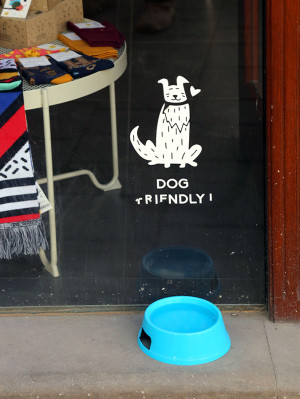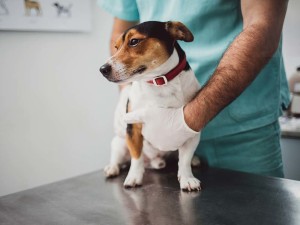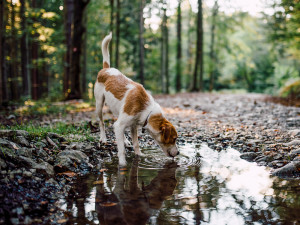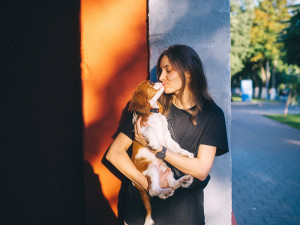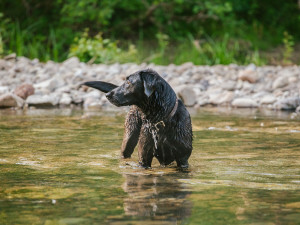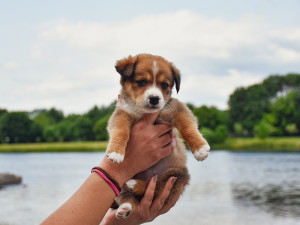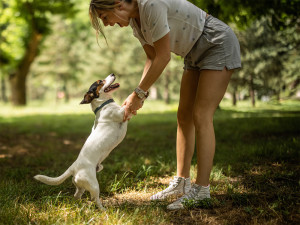Giardia in Dogs: Signs, Symptoms and Treatment of This Parasite
If your dog drinks from puddles or splashes around in lakes, read this.
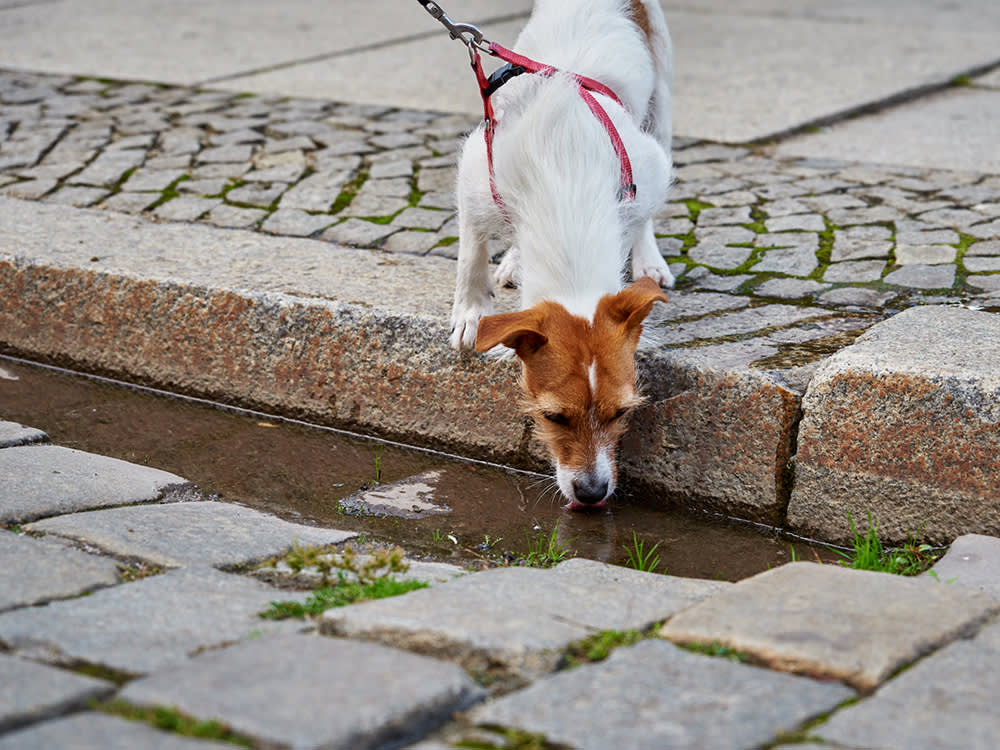
Share Article
As a vet, I see lots of diarrhea — and when I say “lots,” I mean lots. One of the common causes of diarrhea in dogs worldwide is Giardia duodenalis, a parasite that dogs get from drinking from puddles, lakes, streams, or other sources of stagnant water, along with contacting contaminated feces. While it’s a year-round risk, giardiasis (the infection caused by Giardia) cases peak in the summer because people and pets spend more time outdoors and traveling.
Here’s everything you need to know about Giardia in dogs, including how to spot it, treat it, and prevent it from happening in the first place.
What is giardia?
Giardia is a ubiquitous single-celled protozoan parasite that can live in the intestines of dogs. The parasite thrives in cool, moist environments and can survive for months in the right conditions. Giardia can infect dogs, cats, wild animals and people too.

How do dogs get Giardia?
Giardia is transmitted by a fecal-oral route, meaning that the parasite is swallowed in food and water contaminated with feces. Your pet does not have to eat poop to get the parasite. In fact, dogs most commonly get giardiasis by drinking from contaminated water sources (think: puddles, gutters, lakes, and streams).
What are the symptoms of giardiasis in dogs?
Giardiasis symptoms in dogs can include diarrhea, gas, abdominal discomfort, nausea, and vomiting. That said, an infection can be present without symptoms. Not all dogs show symptoms of a Giardia infection but when they do the most common symptom is watery diarrhea. Additional giardiasis symptoms in dogs may include:
Severe diarrhea (often with blood and mucus)
Weight loss
Decreased appetite
Gas
Dehydration
Dry or poor coat appearance
If your dog has diarrhea that persists beyond 24 hours or is very sudden and severe, take them to the vet ASAP.
How is Giardia in dogs diagnosed?
Diagnosis is often made by evaluating fecal material under a microscope. However, the little parasite giardia can be difficult to find. So, in addition, we use a nifty “snap test,” adding some stool to a solution that gives us a positive or negative result for Giardia (like a pregnancy test for poop). This test is very sensitive to the presence of Giardia in dogs.
What is the treatment for giardiasis in dogs?
To treat giardiasis in dogs, veterinarians will typically prescribe either a dewormer called fenbendazole or an antibiotic called metronidazole for a course of five to 10 days. For difficult cases where the diarrhea just won’t go away, both medications may be used in combination. Your pet’s poop should be retested two to four weeks after finishing the medication.
How long does it take for a dog to recover from Giardia?
Most healthy dogs recover from giardiasis within a few weeks. In some cases, supportive treatment, including IV fluids and hospitalization, may be required if dehydration or severe diarrhea persists. Puppies, senior dogs, and those with compromised immune systems are at higher risk for complications, including death. Your veterinarian will determine the best course of treatment.
How can giardiasis in dogs be prevented?
The best way to prevent a Giardia infection is to keep your dog from drinking from puddles, lakes, streams, or other sources of stagnant water (easier said than done, but effort is everything). Dog park puddles carry a higher risk than, say, fresh rainwater pooled in a birdbath or fountain. Remember, Giardia is transmitted orally, and what better place to have concentrated levels of poop than a dog park, especially when some pet parents are not diligent about removing their dog’s poop.
It may also be advisable to treat other animals in the same household while treating the infected, symptomatic pet. There is a vaccine available for giardia in dogs which research opens in new tab shows can prevent Giardia infections in both dogs and humans. However, most veterinarians don’t recommend it unless your dog is at really high risk or is one of those pets who gets giardiasis frequently.
There are also environmental control measures that can be taken to prevent reinfection. Be vigilant about clearing fecal material from the environment. If your dog has been diagnosed with giardiasis, it is often recommended that you wash as many areas of your environment as possible, followed by disinfection with a solution of bleach diluted in water (another measure that’s easier said than done).
Pick up your dog’s poop frequently.
If you have cats (indoors or outdoors), pick up their poop too.
Clean your dog’s bowls regularly with soap and water.
Wash your dog’s toys and bedding often.
Disinfect areas such as crates and kennels
Avoid walking your dog in moist areas where other dogs or wildlife may have pooped.
Bottom Line
Most Giardia infections will resolve within a couple of weeks with proper treatment. However, the best way to protect your dog from coming down with a bad case of diarrhea from this parasite is to keep their environment clean and don’t let them drink from stagnant water sources. See your veterinarian if your dog has diarrhea that lasts longer than 24 hours or if they’re showing other signs of illness.
FAQs
Can Giardia infections recur?
Yes, dogs can easily reinfect themselves with giardia. That's why it's important to thoroughly clean all the areas your dog may have touched.
Is giardiasis more common in puppies?
Because their immune systems aren't as developed as older dogs, puppies are more likely to contract Giardia.
Is there a vaccine available to prevent giardiasis in puppies?
Yes, the Giardia vaccine can keep your dog from getting sick. Ask your veterinarian if it's right for your pup.
Can I get giardiasis from my dog?
It’s possible but unlikelyopens in new tab. There are several kinds of Giardia and dogs are most commonly infected with a variant that doesn’t infect humans.
References
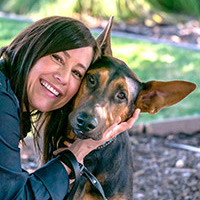
Dr. Shea Cox, DVM, CVPP, CHPV
Dr. Shea Cox is the founder of BluePearl Pet Hospice and is a global leader in animal hospice and palliative care. With a focus on technology, innovation and education, her efforts are changing the end-of-life landscape in veterinary medicine.
Related articles
![Veterinarian examining a dog]()
My Dog Has Diarrhea. Should I Call the Vet?
Certain symptoms could mean your dog is battling a potentially fatal condition called hemorrhagic gastroenteritis (HGE). Here’s everything you need to know.
![Dog Drinking Water From A Pond In The Nature]()
Vets Issue A Warning After Two Dogs In Missouri Pass Away From Leptospirosis
The deadly disease is most common in autumn and late summer. Find out how to keep your pup safe.
![Woman holding a beagle in warm dappled summer light]()
You’ve Got a Summer-Lovin’ Pup. Here’s How to Keep Them Safe
Some like it hot (but not most dogs). Here are the season’s health hazards, from fleas to foxtails.
![Black Lab playing in creek]()
Why Your Dog Should Stay Far, Far Away From Blue-Green Algae This Summer
Consider getting a water-testing kit to keep your pup safe.
![Two hands holding a very young tan and white puppy up in front of a lake landscape]()
How to Socialize a Puppy
Everything you need to know to get your new addition off to a good start.
![Beautiful young woman standing on grass area in park and playing with her dog.]()
A “Last-Ditch Effort” Antibiotic May Help Cure the Mystery Dog Illness
What we know about the antibiotic chloramphenicol.
